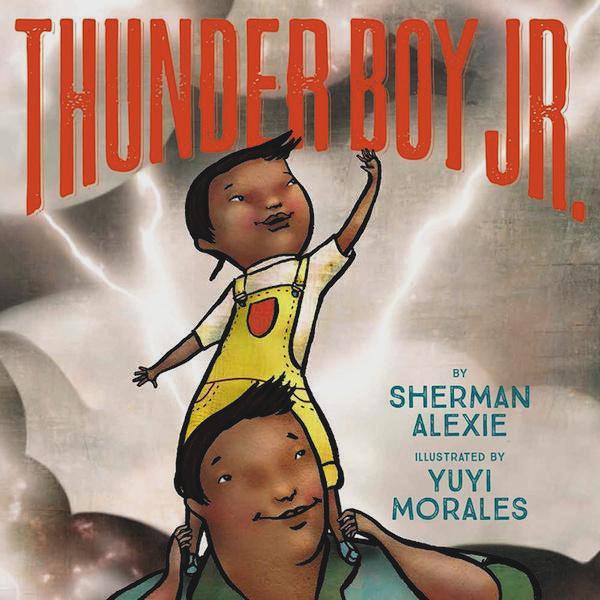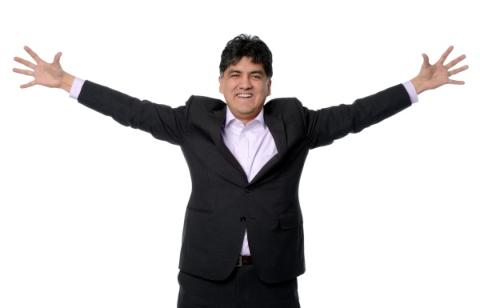 |
Canku Ota
|
 |
|
(Many Paths)
|
||
|
An Online Newsletter
Celebrating Native America
|
||
|
July 2016 - Volume 14
Number 7
|
||
|
|
||
|
A Conversation With
Sherman Alexie About Thunder Boy Jr. and Other Stuff
|
||
|
by Jason Morgan Edwards
- Indian Country Today Media Network
|
||
Thunder Boy Jr., the new children's picture book by Sherman Alexie (Little, Brown Books for Young Readers, 2016), is the latest in long line of literary works by the Native author and humorist. Alexie has been touring the country, doing personalized readings for schoolchildren and other audiences for several months. Recently he stopped at the historic KiMo Theatre in downtown Albuquerque, where he regaled the capacity crowd for more than two hours, offering insights into the book's creation as well as personal revelations. Indian Country Today Media Network sat down with Alexie for a glimpse into his life and work.
Is this your first children's book? Yeah, it's my first picture book. I wrote a book for young adults, for teenagers. But this is my first book for the little ones. It was really hard. I thought writing a picture book would be easy, because I write poems. But, it was pretty tough. It's hard to write a book that's fun for kids and for the adults [reading] the book to the kids. What is Thunder Boy Jr. about, from your perspective? This book is about a little Indian boy and his search for self-identity. And about a family that loves him so much that his search is okay. It's the same search we're all on, all the time. We spend our whole lives asking, Who am I, who am I, who am I? That question is going to have different answers at different times in your life. This book is about accepting the fact that our children [want to be themselves]. I want my children to go on great adventures. And to do it on their own, without me. I want them to grow up to be amazing adventurers, see things I never saw and hear things I never heard. I've seen what I've seen. I don't know what my children are going to see, [but] I'm excited about it. Where did the idea originate? I knew I wanted to write a picture book. I thought about it for a long time, especially because of my own sons. They loved their favorite picture books. I wanted to write a book like that; one that parents would have to read to their children a thousand times. Is there anything that you were trying to communicate, in particular, through this story? The big thing is the idea that, as a kid, you can want your own identity. And that's really great. You don't have to be like your family. You can be your own person, and you're still a part of your family. It just means that you've made your family bigger. Is the story autobiographical? No, no.... I'm named after my father, so it's autobiographical in that way. I never thought to actually change my name. But I certainly changed my identity. I was always expanding my horizons and changing my family. No way would there have ever been a Sherman III...no way, no way, no way. I wanted names so that the kids would always find keychains with their names on them. And t-shirts and mugs. So my kids are Joseph and David. How do you view the significance of the naming of a child? What do you think the percentage of Natives in the country who have gone through a naming ceremony is? How many do you know? There are all sorts of Native people who don't even have the chance to participate in a naming ceremony. I would say our children do not belong to us. And their futures belong to them. We can give them our culture. We can teach them things, and then they make their own decisions. We can’t punish our children for not wanting to be like us. Do you think you're anything like your ancestors of a hundred years ago? The thing is, people and cultures evolve. I would ask [my critics], 'What if one of [your] grandchildren wanted a name of their own? How would [you] respond? Are [you] going to punish [your] grandchild?' How do you respond to literary critics who say you're not traditional enough? It's just how the Indian world is. Everybody's trying to pretend they're more Indian than the next person. And with my books, some people are always looking for a way to make it a negative. I read the book to [a group of] about two hundred Indian kids. They loved it. I will take them over Indians who are worried about it. Do you feel any pressure to be more Native, or more authentic? I write who I am. This is always who I've been. Growing up on the rez, and wanting to go to college, people criticized me for wanting to do that. So it's just one of the negative parts of being a Tribe. People think you're supposed to be exactly like your Tribe. So, I try to focus on the positive stuff in the Indian world. Do you feel any obligation to educate non-Natives about our culture, or clear up misconceptions? The thing is, I don't write about ceremonies. I don't write about sacred stuff. I don't think I need to write about sacred stuff. I write about my characters as twenty-first-century Native Americans. I don't go into the religious stuff because I don't want that to be part of my books. This book isn't a ceremony. There's no sacred thing going on. It's a father and son talking about nicknames. Do you see yourself as a role model? I am a role model. There are hundreds of Native kids writing because of me. I'm tired of having this conversation. It's been happening for twenty years. It's limiting to all of us ... to the people who read me, to other writers ... to Natives in general. It keeps us trapped in one place. I would say to [my critics], I'm sure there's something amazing that happens to them every day. And it's completely unpredictable, the great things that happen to us. It may not happen to us because we're Indian, or it may. But our lives are so amazing. To spend our time worrying about how Indian something is, or not, is limiting. No matter where I go in my life, I'm Indian. I'm Native. Every decision I make is informed by that. But I am also my own person. |
||
|
|
|
|
||
|
|
||
| Canku Ota is a free Newsletter celebrating Native America, its traditions and accomplishments . We do not provide subscriber or visitor names to anyone. Some articles presented in Canku Ota may contain copyright material. We have received appropriate permissions for republishing any articles. Material appearing here is distributed without profit or monetary gain to those who have expressed an interest. This is in accordance with Title 17 U.S.C. Section 107. | ||
|
Canku Ota is a copyright ©
2000 - 2016 of Vicki Williams Barry and Paul Barry.
|
||
 |
 |
|
|
The "Canku
Ota - A Newsletter Celebrating Native America" web site and
its design is the
|
||
|
Copyright ©
1999 - 2016 of Paul C. Barry.
|
||
|
All Rights Reserved.
|
||

